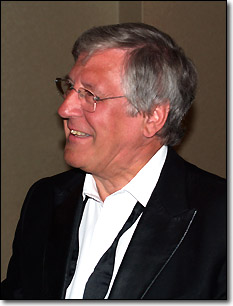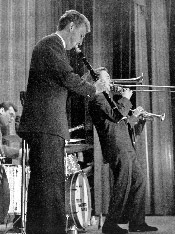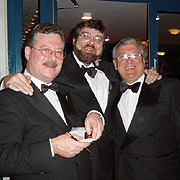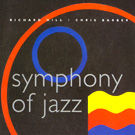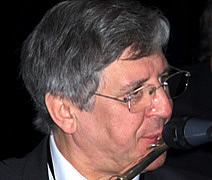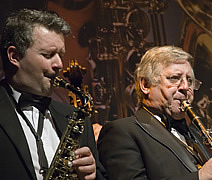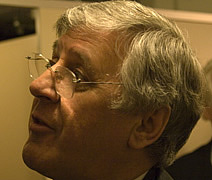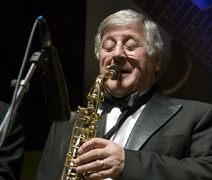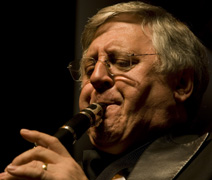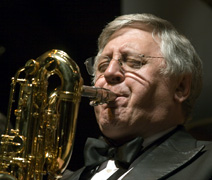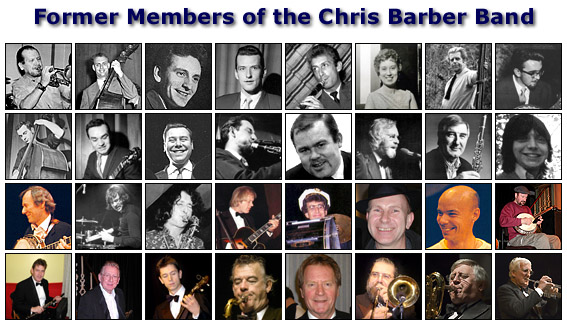 |
|||||||
| Seven Years with Chris Barber: An Appreciation by Tony Carter |
|||||||
I’d first met Bob in the summer of 1994, 14 years ago. I was engaged to play with a 1920s-style Orchestra, The Charleston Chasers: Bob was the trombonist. He had written numerous arrangements for them and he specialized in capturing the exact sound of early Duke Ellington and, as a trombonist, was seemingly more "Tricky Sam" than Tricky Sam. We hit it off immediately, both of us having a desire for correctness and authenticity that was nurtured by a liberal intake of John Barleycorn, to use an all-embracing term. We worked together periodically and I played for his own "Bob Hunt's Ellington Orchestra" on numerous occasions, and realized along the way that I had used him with my own bands years before at Thorpe Park. The phone call came out of the blue: "'ere Tone, I never fink to call you 'cause you're teaching an' all that, but do you fancy doin' the Barber gig?" He went on to tell me what it was paying, but it wasn't the money that attracted me to say "yes" before even consulting with my wife: it was something far deeper than that. At the time of the call I was heading for 58 years old and had spent a lifetime as a professional musician. That means mostly playing, but also engaging in non-musical employment from time to time when "the devil drove", as they say. How did I come to be involved with this unique world? Simple: when I was fourteen in 1957 I went to a Chris Barber concert at Birmingham Town Hall. Finances at the time were somewhat stretched and I had to suffice with a seat behind the Band in what was, on Symphony days, the Choral location. This was in the days when going to a concert prompted one to dress in one's finery: Italian suits, pointed shoes, stiff collars and tight knotted ties for gents, bouffant hair and flowing petticoats for the ladies. Not for us the licensed bar so much as the El Dorado Coffee Bar afterwards.
There was that low hum of conversation filled with anticipation that subsided gradually into silence as the house lights dimmed - they never went out at the Town Hall - then to rapturous applause the Chris Barber Band emerged in powder-blue Italian suits and struck up with Bourbon Street Parade. I cannot describe the feeling that swept over me in those first few moments. Those were the days when Chris had Ottilie Paterson singing and more to the (my) point, Monty Sunshine on the clarinet. During this concert Monty played a piece called Hushabye. He blew it with such passion that I was completely "blown away". The outcome was that I pestered my father to buy me a clarinet, which he did for my birthday in October that year after extracting a promise from me to knuckle down to school work in an effort to achieve a creditable "School Cert" as it was then. Needless to say school work took a back seat, and at age 17 I turned professional with the Ronnie Hancox Orchestra in the Midlands and embarked on my professional musical career. As this story is about my time with Chris Barber it would be inappropriate to chronicle my musical life prior to joining Chris's band, except to say that it was varied and mostly successful.
At that time the "augment" to the band from an eight-piece to eleven was a temporary one on selected engagements where we three - Bob, Mike and myself - were known as "The Ellingtonians", but destined to become a permanent fixture later. And so it was that on the 27th November 2001, I became a fully-fledged member of The Big Chris Barber Band at the 100 Club in Oxford Street, London and, carrying the mantle of Monty, it fell to me to play the penultimate number of the show, Petite Fleur. I can't recall how many performances I have given of that piece with Chris, but it must be somewhere in the region of eight hundred. I can honestly say that I have dedicated every one, right up until the last one in Gillingham on the 19th July 2008, to Monty, and doing so has meant more to me than possibly anything I have ever done in my career to date. As long as I live, whenever I am called upon to perform it, the thrill of hearing his sound for the first time all those years ago is still with me, as fresh as ever. I met Monty on several occasions before joining Chris and he was delighted to hear how his artistry had influenced me to forge a professional life in music, even though I had taken a different road to his. But it was interesting, he told me, that over the years several international players had written to him to let him know it was through him that they too had become involved in the business. Of course I had been playing Petite Fleur for years, but in the Sydney Bechet key of G Minor concert, which made it a relatively easy task on the clarinet or soprano sax, being in the key of A minor. So when Bob told me initially that Chris was going to make a little anecdotal introduction to the piece, by saying how I heard Monty all those years ago and now I was going to play his piece etc., etc., Bob said, "'ere, Tone, learn Petite. I'm gonna write a chart and put a Big Band swing section on the bridge". I said, "You mean where it starts on a G7th chord?" "Naa, mate, the key we're gonna do it in is A-flat Minor concert: that's the key Mont' played it in!" Which, dear reader, puts the clarinet in B-flat Minor: a whole different ball game! Apparently Monty learned this piece from the Sydney Bechet recording and the turntable must have been running slightly fast. The result was that Monty heard it in A-flat Minor, a semitone up! And that was it! Good ole Monty! Over the subsequent years I think I have travelled every Autobahn in Germany, many times over, as well as similar journeys across Denmark, Holland, Sweden, and Switzerland. Highlights? - many: too many to mention all, but playing Philharmonic Hall in Berlin was a thrill, standing on a stage that had played host to Herbert Von Karajan and all the greatest musicians in the world. The same feelings of awe emerged when playing other great stages that had hosted the great soloists and conductors throughout the ages: places like The Gewandhaus in Lepzig, Die Glock in Bremen, the Philharmonic Halls of Cologne and Munich. Just to know you are standing on the spot where Heifitz, Kreisler, Perlman and all the other greats had stood was something almost impossible to explain.
Players have come and gone in the seven years I was with the band. John Crocker was the first to leave. Crock and I established a lively rapport and discovered that we shared the same birthday, with only a modest difference in age. The last time I rang him to wish him "Happy Birthday", he responded, humorously, "Can't you leave an old man alone!" He He!
When Pat and I left in July 2008, only John Slaughter remained from what one could refer to as "The Good Old Days!" - a 40-year-plus man! The next oldest serving member is Mike Henry, who, like me at the time, was a mere seven year-er. It is an accolade to Chris that, for something like 54 years, he has maintained a unique position with his band in the Jazz World and it seems set to continue for many more. One has one's ups and downs, and when you are working and travelling so intensely, life is not without its altercations, but the camaraderie within the band meant that such occasions were forgotten almost as quickly as they emerged. And so, the time came for me to review the past and assess the future, and I decided to leave the band and the road, to concentrate on other aspects of my life, but the experience of the past seven years is indelibly imprinted in my mind. After all, how many people can say they ended up soloing with the same band that started it all for them a half-century ago? |
|||||||
|
|||||||
